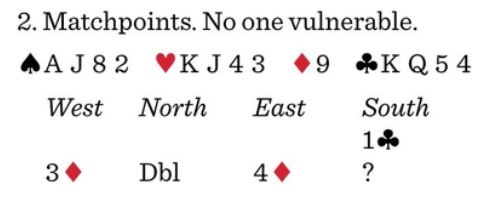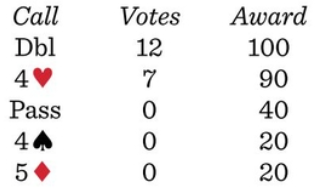
What’s your call?
| 4♥ | 4♠ | 4NT | ||
| 5♣ | 5♦ | 5♥ | 5♠ | 5NT |
| 6♣ | 6♦ | 6♥ | 6♠ | 6NT |
| 7♣ | 7♦ | 7♥ | 7♠ | 7NT |
| Pass | Dbl |
Lawrence: “Double. Takeout. Should be a consensus choice.”
Meckstroth is on board. “Double. Want to make sure we get to the right suit. (If by some chance this is a penalty double, then I bid 4♥.)”
Boehm: “Double. Modern.”
Colchamiro: “Double. Just enough strength to act. I think. 4♥ here might well preclude spades. If partner passes, I sort of like my defensive structure.”
The Sutherlins: “Double. Takeout. Enough to play 4♥ or 4♠.”
Sanborn doubles. “Hopefully this tells partner I want to bid something. It might show a better hand, but bidding either major could be wrong as well.”
Hampson doubles, recognizing that partner may not have both majors.
The Coopers double. “What else? As much as we may prefer to make all the decisions ourselves, it would be silly to guess which major partner is stronger in. Partner didn’t promise that he’s 4–4 either.”
Kennedy’s double is card-showing, not takeout. “This is the way to show extra values.”
Meyers: “Double, and I hope that is responsive.”
Falk: “Double. If this is not responsive, we need a new system. In a regular partnership, we would have a rule, e.g., North’s double promises at least four spades; he often has at least four hearts, but does not guarantee them. But either 4♥ or 4♠ could land us in a 4–3 fit that won’t play well when the opponents are distributional. So I have to try a responsive double and a prayer.”
“Can I bid 4♦ , too?” asks Weinstein. “No? OK, I’ll try 4♥. I’d like to double showing both majors but I think that shows something more like a 2NT rebid. Hopefully partner pulls to 4♠ on his way to 5♣ when he doesn’t have hearts.”
That’s how Rigal sees it, and that’s why he chooses to bid 4♥. “I don’t think double is this hand. I suspect it’s extras, balanced, and partner passes when balanced. It could certainly be right to defend here, but my soft cards argue against that.”
Stack: “4♥. Bidding the four-card majors up the line. If double here was responsive, asking partner to bid a major, then that would be the perfect bid. But I don’t believe that is what double means here.”
Cohen, 4♥: “I reject the reflex action of a ‘responsive double’ (if that’s what it is). Really, double should just show extras. Partner is likely to leave it in. Before East bid 4♦ , I was going to drive this to four of a major, so I see no reason to change my plan. I can’t afford to get 300 when we are due 420.”
Walker’s 4♥: “This should guarantee both majors or a good plan B (big club suit) if partner bids 4♠ (denying four hearts). Double would suggest good defense and fewer major-suit cards.”
Robinson bids 4♥. “I’m not sure that double here would show a 4=4=1=4 hand.”
4♥ from the Sutherlins. “If partner doesn’t have four hearts, we hope he will bid 4♠. No guarantees!”


